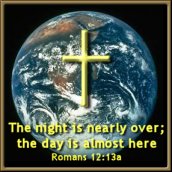
|
 The vision of the New Jerusalem now over, the Apostle John concludes the chapter with a loosely knit series of affirmations and exhortations. The purpose of the Epilogue is threefold: (1) to verify the authority of the book; (2) to authenticate the prophecies of its contents; and (3) to affirm the imminency of the Lord's return.
Affirmation (22:6-17)
Rev 22:6 And he said unto me, These sayings are faithful and true: and the Lord God of the holy prophets sent his angel to shew unto his servants the things which must shortly be done. The angel (21:9, 15; 22:1) affirms the authenticity of the prophecies of the Apocalypse as well as communicates the urgency of the message (22:6). The three statements, "Behold, I come quickly" (22:7, 12, 20), each have a different emphasis, and seem to establish the framework of the Epilogue.1 In verse 7 we are presented with the sixth beautitude of the Apocalypse which reiterates the message in 1:3. As we observe its message, let us pass on to others the truth of the "blessed hope." John again makes an error in judgment as he prostrates himself at the feet of the angel messenger (22:8-9). He is told by the angel that he is a fellow prophet and servant as he is, and that only God is worthy of our worship. The angel further explains to John to "Seal not the sayings of the prophecy of this book: for the time is at hand" (22:10). Daniel was told to seal the book till the time of the end (cf. Dan. 8:26; 12:4, 9). As noted earlier, the words "at hand" mean that the time of Christ's return is imminent or impending, and that it could happen at any time (See Rom. 13:12; Phil. 4:5; 1 Pet. 4:7). Verse 11 concerns the character of both the just and the unjust, in that one's decisions ultimately determine one's destiny. This is especially true in light of the imminence of the Lord's return. Christ proclaims in verse 12 His imminent return and the rewarding of His servants. The judgment seat of Christ is especially in view here (2 Cor. 5:10; Rom. 14:10; 1 Cor. 3:9-15). Jesus had spoken to His disciples: "For the Son of man shall come in the glory of His Father with His angels; and then He shall reward every man according to his works" (Matt. 16:27). Christ declares in verse 13: "I am Alpha and Omega, the beginning and the end, the first and the last." This relates to 1:8 and 21:6 where God Himself speaks; although here Christ applies the title of "Alpha and Omega" to Himself.2 The letters Alpha and Omega are the first and last letters of the Greek alphabet. God is eternal and is the beginning and the end of all things (Isa. 41:4). Verse 14 gives us the seventh and last beautitude, which describes the characteristics of the saved who have access to the tree of life and entrance into the heavenly city. They have access for they have washed their robes by faith, which is the criteria for eternal life.3 Described in verse 15 are all those who are excluded from the heavenly city by virtue of their unbelief, which is confirmed by the permanence of their condition (cf. 21:8, 27). The testimony of the angel, sent by Christ, concerns the complete contents of the Revelation, which is given to the churches (22:16). This is the first instance of the word churches (ekklesia), since 3:22.4 Christ is seen first in relation to the nation Israel ("the root and the offspring of David"), which relates to both His deity and His humanity (cf. Isa. 11:1, 10). As "the bright and morning star" He will appear at the rapture for His church (cf. Num. 24:17); whereas, to His people Israel He will appear as the "Sun of righteousness" (Mal. 4:2).5
In verse 17 the Spirit (Holy Spirit) and the bride (Church) extend the first invitation. Last, everyone who is not of the community of faith are invited to partake of the water of life freely (cf. Isa. 55:1; Jn. 7:37).
Admonition (22:18-20)
Rev 22:18 For I testify unto every man that heareth the words of the prophecy of this book, If any man shall add unto these things, God shall add unto him the plagues that are written in this book: These verses are a warning to any who would add to or take away from the message of the book. Although warnings of this nature were common in the OT (cf. Deut. 4:2; 12:32; Prov. 30:6; Rev. 1:3),6 this warning seems to be especially serious in light of the consequences. In light of the solemn warning against the misuse of the writings of the book, the Lord Jesus Christ adds a final affirmation of the imminence of His coming, which could possibly refer to the invitation in verse 17. The Apostle John responds, "Amen", which means, "So be it." His longing for the Lord's return is accentuated by his prayer, "Come, Lord Jesus" (22:20).
Benediction (22:21)
Rev 22:21 The grace of our Lord Jesus Christ be with you all. Amen. Since the Revelation began as an epistle it would be customary to end it with a benediction. Swete notes: "An Apocalypse in its inner character, a prophecy in its purpose, the Book is in its literary form an Epistle, and therefore begins and ends with the epistolary forms familiar to the Asian Churches through the Epistles of St. Paul."7 The Apocalypse ends as it began (cf. 1:4), with an extension of grace to its readers from our Lord Jesus Christ. As we read and observe the words of this prophecy, may the grace of our Lord Jesus Christ so transform and touch our lives, that we can proclaim with the Apostle John, "Even so, come Lord Jesus."
|